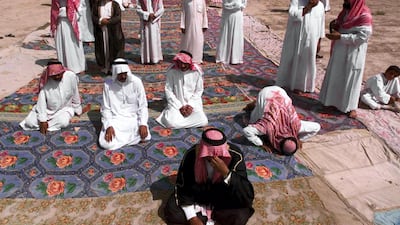Who are the bidoon?
When Kuwait gained independence from the UK in 1961, two categories of citizens were defined: those who had resided in Kuwait before 1920, and those who came between 1920 and 1948, often from Lebanon, Palestine and Syria.
A third group became know as the bidoon, a word that means ‘without’. They included Arab and non-Arabs, and were considered potential citizens. They were eligible for state education and healthcare but without voting rights. The government granted them cards in the early 1960s, categorising them as 'temporarily without citizenship'.
Large numbers of bidoon fought for Kuwait during Saddam Hussein's invasion in 1990. But afterwards, they lost their residency permits, ID cards were not renewed and bidoon lost the the health care and education coverage.
Bidoon in the UAE
In 1972, Federal Law Number 17 stipulated that citizenship would be granted to those who had lived in the UAE since 1925. Those who had resided in the UAE since 1940 were to wait 20 years to apply. Those from Oman, Bahrain or Qatar were eligible to apply after three. Those from other Arab states were eligible after 10 years. Additionally, citizenship could be awarded under special circumstances.
Many did not apply. Some where unfamiliar with the idea of citizenship, others feared it would be a barrier to traditional migration patterns. Illiteracy was common. Just 27 per cent of men and nine per cent for women could read in 1970.
In the 1990s, the Ministry of Interior took over the kafala sponsorship system from the Ministry of Labour, signifying a shift as residency from a matter of demographics to a security issue.
In 2004, the Emirates Identity Authority was established and the nationaI ID card project began. A prerequisite for citizens to acquire an ID card was the 'family book', a document that traces genealogical decent and is only owned by Emirati men or unmarried women above age 34.
The requirement of a family book rendered passports insufficient proof of citizenship.
Prior to 2004, those seeking citizenship had to go through emirate of residence first and then the Ministry of Interior in Abu Dhabi. From this point, applicants had to go directly to Ministry of Interior with a locally issued family book, thereby federalising the citizenship process.
A 2006 initiative had the Supreme Federal Council approved the naturalisation of 1,294 people. Following its success, the government called on all bidoon to register as part of a 60-day campaign in 2008.
Comoros Islands
That year, the UAE and Kuwait governments reached an agreement with the Comoros Islands that it would grant passports to the bidoon. The UAE and Kuwait have both made significant investments in infrastructure on the island nation, the 17th poorest country in the world.
It was initially agreed that 4,000 bidoon families would become naturalised Comorians.

